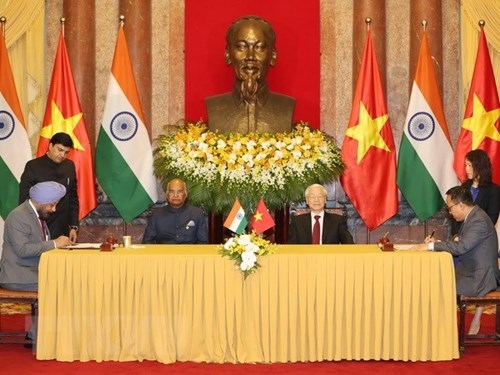The joint statement said during their talks, the two Presidents discussed bilateral ties and regional and international issues of common concern in a warm and friendly atmosphere.
The two leaders reiterated the time-honored friendship between the two countries and agreed that bilateral ties have developed strongly across the fields following the establishment of a strategic partnership in 2007 and the elevation of ties to a comprehensive strategic partnership in 2016.
On the basis of the good bilateral ties, the leaders agreed to maintain regular visits at all levels and in all channels of Party, State, Government, legislature, localities and people-to-people exchange, as well as the regular operation of bilateral cooperative mechanisms while effectively implementing signed agreements.
    |
 |
|
President Nguyen Phu Trong and Indian President Ram Nath Kovind witness the signing of a Memorandum of Understanding on cooperation between the Vietnamese Foreign Ministry's Department of Foreign Affairs and Indian Business Association |
The two leaders agreed that defense-security cooperation is an important pillar of the bilateral Comprehensive Strategic Partnership and reached a consensus on effectively implementing the Joint Vision Statement on Vietnam-India Defense Cooperation for 2015-2020.
They agreed to boost cooperation in personnel training, cyber security, information sharing, among others.
The leaders took note of strong growth in bilateral trade and expressed belief that the goal of 15 billion USD in bilateral trade will be achieved early.
They urged the building of specific plans to realize signed agreements on promoting trade, while calling for removing trade obstacles, including technical and non-tariff barriers, and stressing the need for close coordination and regular consultations to address problems arising in bilateral trade.
The leaders agreed to continue promote bilateral investment ties, including joint schemes between the Vietnam Oil and Gas Group (PetroVietnam) and the Oil and Natural Gas Corporation of India in exploring and exploiting oil and gas on land, continental shelf and exclusive economic zone of Vietnam.
The Vietnamese President appreciated India’s long-term and continuous support in various forms for Vietnam’s development projects.
The two sides agreed to focus on implementing India’s non-refundable aid and preferential credit for Vietnam as well as annual projects under India’s Quick Impact Projects (QIPs) fund for Cambodia, Laos, Myanmar and Vietnam.
The leaders agreed on the importance of stronger connectivity between Vietnam and India and pledged to push the disbursement of the USD 1 billion credit package for infrastructure and digital connectivity projects in the framework of the ASEAN-India cooperation.
The leaders welcomed bilateral coordination in cultural activities and heritage conservation, and affirmed their support of exchanges between their friendship organizations and scholars. They also promised to facilitate the operation of each other’s press and media agencies.
The two sides agreed on the importance of people-to-people exchange and tourism.
On regional and international issues of common concern, the two leaders shared many viewpoints. They affirmed the importance of building a peaceful and prosperous Asia and Indian-Pacific regions on the basis of respect for sovereignty and international law, navigation and aviation freedom.
The Indian President valued Vietnam’s contributions as coordinator of ASEAN-India ties in 2015-2018. The Vietnamese President affirmed support of India’s Act East policy and hailed India’s support of ASEAN’s central role in the forming regional structure.
The two sides pledged to continue coordinating and supporting each other at multilateral forums, especially those in the framework of the United Nations, and re-affirmed mutual support for each other’s candidacy as a non-permanent member in the UN Security Council, Vietnam in the 2020-2021 tenure and India in the 2021-2022 tenure.
The two sides expressed concern about current developments in the East Sea and reiterated the importance of maintaining peace, stability, security and freedom of navigation and overflight as well as no obstruction of economic activity in the waters. They emphasized the need to fully and effectively implement the Declaration on the Conduct of Parties in the East Sea and early finalize an effective and binding Code of Conduct. They underlined the importance of settling disputes by peaceful measures, including fully respecting legal and diplomatic processes in line with international law, especially the 1982 UN Convention on the Law of the Sea.
The two sides condemned terrorism in all forms, and Vietnam shared India’s concern that terrorism is one of the most serious threats to global peace, security and stability.
President Ram Nath Kovind invited his Vietnamese counterpart to visit India, which the latter accepted with pleasure.
Source: VNA